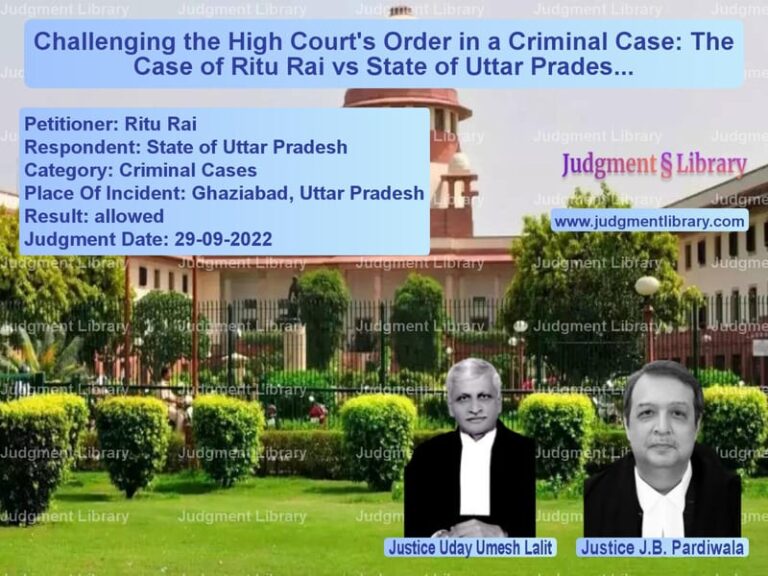Supreme Court Ruling on GM Mustard: Environmental and Legal Implications
The case of Gene Campaign & Another vs. Union of India & Others is a landmark judgment dealing with the environmental, health, and legal concerns surrounding genetically modified (GM) crops, specifically GM mustard (DMH-11). The Supreme Court of India was tasked with determining whether the environmental release of GM mustard adhered to legal frameworks and scientific assessments, and whether it posed risks to human health and biodiversity.
The petitioners, including Gene Campaign and other environmental organizations, filed multiple writ petitions challenging the decision of the Genetic Engineering Appraisal Committee (GEAC) and the Union of India. They sought stringent regulations on GM crops and requested a moratorium on their release until a transparent and scientific risk assessment was conducted. The core issues revolved around biosafety, environmental risks, and the regulatory framework governing GM crops in India.
Background of the Case
In 2010, the Centre for Genetic Manipulation of Crop Plants (CGMCP) at the University of Delhi developed DMH-11, a genetically engineered variety of mustard. The Union of India, through the GEAC, granted approval for its environmental release, stating that the crop was designed to improve yields and reduce India’s dependence on edible oil imports. However, environmentalists and agricultural experts raised concerns about the potential negative effects of herbicide-tolerant (HT) crops, biodiversity risks, and the lack of long-term studies on GM mustard’s impact on health and the environment.
Petitioners’ Arguments
The petitioners contended that the approval for GM mustard was granted without sufficient scientific scrutiny and long-term studies. Their primary arguments included:
- GM mustard (DMH-11) is an herbicide-tolerant (HT) crop, which could lead to increased herbicide usage, affecting soil health, non-target organisms, and biodiversity.
- The regulatory framework governing GM crops in India is inadequate and lacks transparency. The public was not given full access to biosafety data before the approval of GM mustard.
- The introduction of GM mustard could result in genetic contamination through cross-pollination, threatening non-GM and organic mustard varieties.
- Several global studies have highlighted potential health risks associated with GM crops, yet the government proceeded with approvals without addressing these concerns.
- The regulatory body, GEAC, ignored recommendations made by the Technical Expert Committee (TEC), which had previously called for a moratorium on HT crops.
- There was a lack of meaningful public consultation, and state governments were not adequately involved in the decision-making process.
- The Union of India failed to comply with the precautionary principle, which is essential when dealing with uncertain and potentially irreversible environmental risks.
Respondents’ Arguments
The Union of India and GEAC defended their decision, arguing that:
- GM mustard was developed after rigorous scientific research and regulatory scrutiny.
- The technology used in GM mustard is similar to that successfully implemented in other countries, leading to increased crop yield and reduced dependence on edible oil imports.
- The government followed a precautionary approach by mandating post-release environmental monitoring of GM mustard.
- The risks associated with GM crops were addressed through multiple biosafety studies and regulatory safeguards.
- The approval process was transparent, with opportunities for public comments and stakeholder consultations.
- The introduction of GM mustard was necessary for India to achieve self-sufficiency in edible oil production and reduce import dependency.
Supreme Court’s Observations
The Supreme Court carefully analyzed the regulatory process, the precautionary principle, and the concerns raised by the petitioners. The Court noted:
“The precautionary principle must be adhered to in matters concerning environmental and human health risks. The regulatory authorities must ensure that all potential risks are thoroughly assessed before granting approvals for GM crops.”
The Court emphasized the importance of independent scientific assessments and criticized the lack of long-term studies on the health and environmental impact of GM mustard.
Final Verdict
After extensive deliberations, the Supreme Court ruled:
“The approval granted for the environmental release of GM mustard is subject to further scrutiny and compliance with stringent environmental safeguards. The government must conduct additional long-term studies on its impact before commercial cultivation is permitted.”
The Court directed the government to ensure:
- Comprehensive and independent biosafety studies are conducted before further approvals.
- Strict adherence to the precautionary principle in all GM crop approvals.
- Public disclosure of all biosafety data to ensure transparency.
- Consultation with state governments and farmers before making final decisions on commercial cultivation.
Implications of the Judgment
The Supreme Court’s ruling has significant implications for the regulation of GM crops in India:
- It reinforces the necessity of scientific scrutiny and transparency in the approval process of GM crops.
- It sets a legal precedent for balancing technological progress with environmental and public health considerations.
- It highlights the importance of public participation and the need for involving all stakeholders in decision-making.
- It mandates long-term environmental and health impact studies before commercializing GM crops.
Conclusion
This judgment underscores the importance of a robust and transparent regulatory framework for genetically modified crops. While technological advancements in agriculture can contribute to food security and economic growth, they must be implemented cautiously, with due regard for environmental and health safety.
The Supreme Court’s ruling sends a clear message that public health, environmental protection, and scientific integrity must be prioritized over commercial and economic interests. The judgment also paves the way for future regulatory decisions, ensuring that India adopts a science-based, participatory, and precautionary approach towards genetically modified crops.
Petitioner Name: Gene Campaign & Another.Respondent Name: Union of India & Others.Judgment By: Justice Nagarathna.Place Of Incident: India.Judgment Date: 23-07-2024.
Don’t miss out on the full details! Download the complete judgment in PDF format below and gain valuable insights instantly!
Download Judgment: gene-campaign-&-anot-vs-union-of-india-&-oth-supreme-court-of-india-judgment-dated-23-07-2024.pdf
Directly Download Judgment: Directly download this Judgment
See all petitions in Environmental Cases
See all petitions in Public Interest Litigation
See all petitions in Fundamental Rights
See all petitions in Legislative Powers
See all petitions in Constitution Interpretation
See all petitions in Judgment by B.V. Nagarathna
See all petitions in partially allowed
See all petitions in Modified
See all petitions in supreme court of India judgments July 2024
See all petitions in 2024 judgments
See all posts in Environmental Cases Category
See all allowed petitions in Environmental Cases Category
See all Dismissed petitions in Environmental Cases Category
See all partially allowed petitions in Environmental Cases Category







